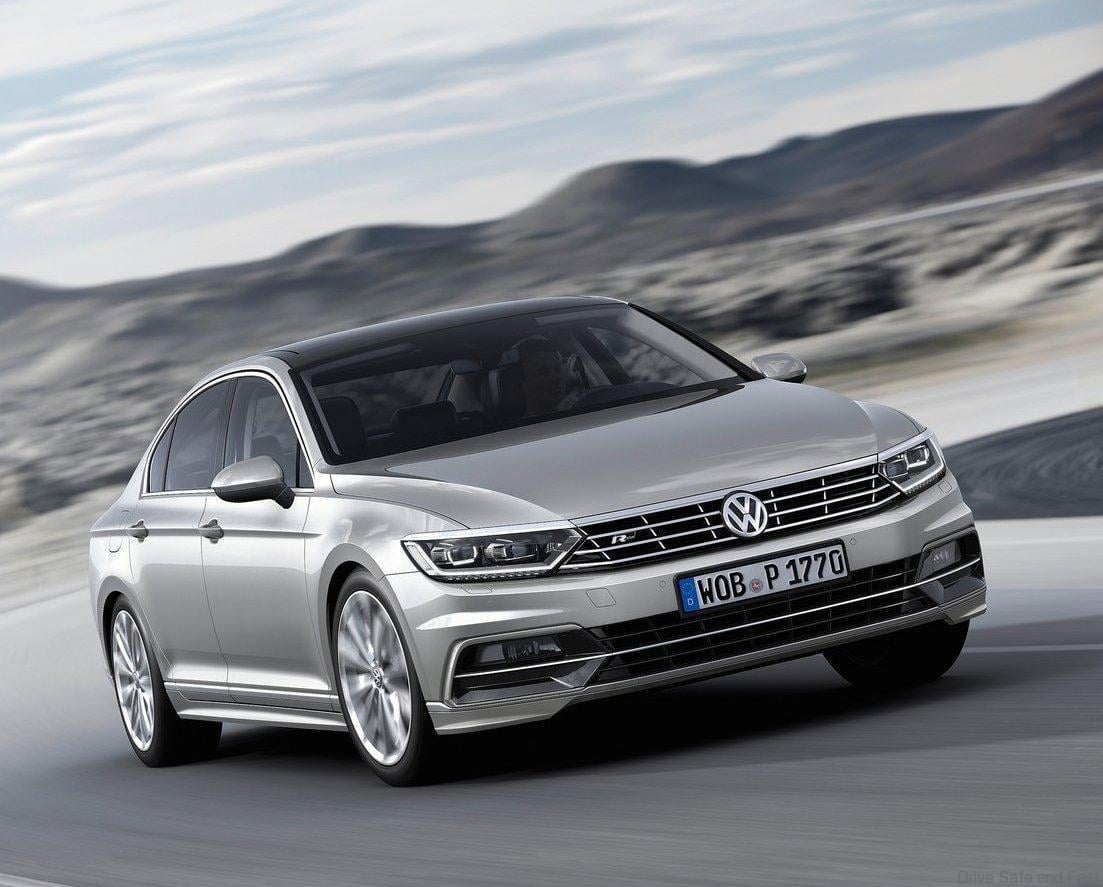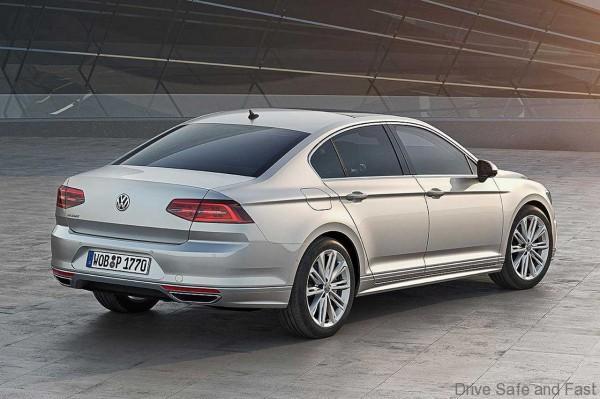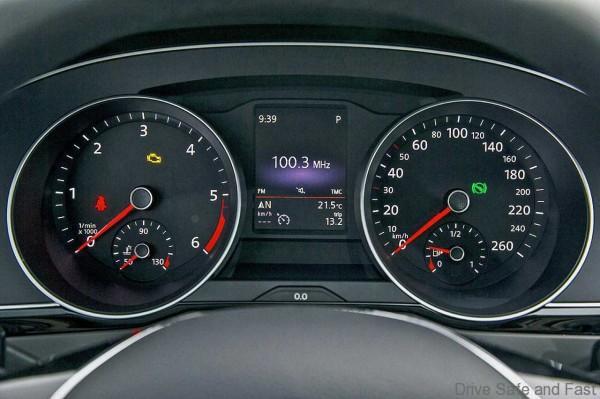Finally we see the pictures and get the details of the 2015 VW Passat (B8) which is not just a facelift, but a brand new vehicle built on a new platform. The eight-generation of the VW Passat is 85 kg lighter than its predecessor and promises to be 20 percent more fuel-efficient. Volkswagen will offer 10 direct-injection turbo engines, with power ranging from 120 hp to 280 hp.
Also a premiere is the first plug-in hybrid version of the Passat, which uses the 2.0-liter TFSI delivering 211 hp but also an electric motor that will offer an electric range of up to 50 km. Using the energy from the 9.9 kWh battery pack and all the gasoline from the fuel tank, the Passat (B8) Hybrid will have a combined range of 965 km. This model will be available with a charging socket located behind the badge on the front grille. As we said, we have plenty of direct-injection engines, such as the two 1.4-liter petrol engines that deliver 125 PS while the other delivers 150 PS and comes with Active Cylinder Technology (ACT). There is also a bigger 1.8-liter TSI engine that generates 180 PS.
The 2.0-liter TSI engine is available in two versions, one delivering 220 PS, while the other one generates an impressive 280 PS, The entry-level 1.6-liter TDI diesel engine delivers 120 PS. In addition, Volkswagen offers two versions of the 2.0-liter TDI engine that deliver 150 PS and 190 PS. A biturbo version of the 2.0-liter diesel engine delivers 240 PS and 500 Nm of torque form 1,750 rpm.
Regarding the new design, the 2015 Passat (B8) looks like a smaller Phaeton, has a length of 4767 mm (2 mm shorter than its predecessor), while the wheelbase was extended by 79 mm to 2.79 mm. As a result, the front wheels moved 29 mm towards the front bumper, while the rear wheels moved 17 mm towards the rear bumper. This means that the passenger compartment offers 33 mm more space for your leg. Moreover, the Passat (B8) is 14 mm lower (1456 mm) and 12 mm wider (1832 mm). Just like the model it replaces, the 2015 Passat (B8) will be offered in three versions: Trendline, Comfortline and Highline. The Highline is offered as standard with the new LED headlights. Moreover, the Passat B8 comes with daytime running lights and LED taillights.
The Passat (B8) Variant comes with an plenty of trunk space, which was increased by 47 liters to 650 liters. When the seats are folded the volume is increased to 1780 liters. The Sedan offers a trunk space of 586 liters, 21 liters more than its predecessor. Inside, we find the new Active Information Display, borrowed from the 2015 Audi TT, which takes the Passat to a new level. Moreover, the interior was also revamped.
Active Info Display
In the Passat, Volkswagen is launching an instrument cluster that has been designed as a full interactive display: the Active Info Display. All instruments are implemented virtually via software. Only the icon lights at the lower border of the display are still implemented in hardware. Navigation information can be shown in 2D or 3D views on a 12.3-inch display. Its resolution of 1,440 x 540 pixels enables extremely precise, high-quality graphics and interactive display of all details.
Take the Navigation mode, for instance: Here the speedometer and tachometer are relocated to the sides in order to create more space for the map. Information on driving, navigation and assistance functions can be integrated into the graphic areas of the speedometer and tachometer as needed. Data that is displayed on the centre console via the infotainment system, such as phone contact pages or CD covers, can also be shown in the Active Info Display in the Passat. Volkswagen is offering the Active Info Display as an optional alternative to analogue instruments.
Head-up display
The new Passat will now also be the first Volkswagen to have a Head-Up display. It projects important information, such as vehicle speed or navigation pictograms, directly into the driver’s primary visual field. Thanks to the projection of the Head-Up display, the driver’s eyes can remain focused on the road while reading data such as vehicle speed. Reaction time can also be significantly reduced by projecting warning messages directly into the driver’s visual field.
The Head-Up display of the Passat is a “combined solution”: the data is projected onto an extending glass panel before the windscreen. Developers succeeded in attaining the same display quality as in much more expensive windscreen systems. When it is not in use, the display can be lowered into the dashboard to protect it, and the opening is closed flush to the dashboard surface. To the driver’s eyes, the projected data appears to be displayed around two metres in front of the Passat. The results: because drivers do not have to shift their gaze back and forth between the instruments and the street nearly as often, they do not have to constantly refocus their eyes, and this reduces eye fatigue. The Head-Up display is activated by a separate control next to the rotary light switch. The driver can decide – from the menu of the infotainment system – which information should be displayed: momentary speed, speed limit, navigation instructions, information on assistance systems or warnings.
Networked assistance systems introduce new era of safety
New assistance, infotainment and convenience systems make individual mobility more sustainable, networked, communicative, driving-active and even safer. The Passat – Germany’s most successful business car – has advanced to create a new business class whose technologies overcome segment boundaries. These technologies include – along with the Active Info Display (a completely digital instrument cluster), extending Head-Up display, new Rear Seat Entertainment system for table computers, Front Assist plus City Emergency Braking with Pedestrian Detection, Emergency Assist (stops vehicle in emergency), Trailer Assist (assisted manoeuvring with a trailer) and a new traffic jam assistant.
Infotainment component system
The new Passat is launching with second-generation infotainment systems from Volkswagen. The latest systems of this modular infotainment platform (MIB) enables a maximum degree of connectivity in coupling to external devices. Its various interfaces include an interface to smart phones and related apps via MirrorLink™. The infotainment systems also have faster processors (optimised booting, quicker route calculation, smoother touchscreen performance, perfected voice dialogues) and new displays with higher resolution (in the 6.5-inch systems). The range of devices consists of the 5-inch systems “Composition Touch” and “Composition Colour”, the 6.5-inch systems “Composition Media” and “Discover Media” (plus navigation) with four-times better resolution (6.5-inch compared to 5.8-inch first-generation display) and the latest version of the 8.0-inch “Discover Pro” radio-navigation system.













